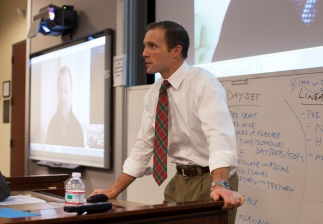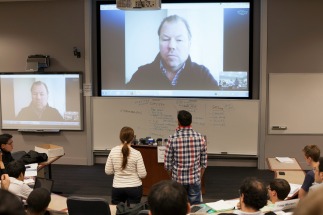News & Stories
Tackling new markets
 In his Business Strategy class, Chris Bingham prepares MBA students to analyze the distinctive approaches that executives use to win in their industries.
In his Business Strategy class, Chris Bingham prepares MBA students to analyze the distinctive approaches that executives use to win in their industries.
“Strategy answers the question of why some firms outperform others, and my class helps students understand how firms can beat their competition,” said Bingham, associate professor and Phillip Hettleman Fellow of Strategy and Entrepreneurship.
The award-winning teacher and researcher brings his own industry experience – which includes work with McKinsey & Company, Deloitte Consulting, PwC and several entrepreneurial firms – into the classroom. He also brings experts from such firms as Deloitte Consulting and Coke, as well as several local non-profit founders, to class as guest speakers.
Students analyze case studies that span multiple industries and firms, ranging from Walmart, Toyota and Eli Lilly & Company to Dropbox, Nintendo and Netflix.
The final case used in a recent mod was Linear Air, a firm in the emergent air taxi industry. The goal of the class session was to understand market creation through Linear Air’s expansion. Students examined the strategy of the company and its competitors and made recommendations for Linear Air’s growth plan.
As students engaged in the case discussion, they were treated to a special surprise: Bill Herp, CEO of Linear Air, joined their class via Skype. Students presented their recommendations for expanding Linear Air to Herp, who gave feedback on their ideas and answered questions about the air taxi industry and his company.
“Bill Herp has graciously and thoughtfully participated in this class over the last few years, and students absolutely love it,” said Bingham. “Connecting via Skype provides a nice element of surprise.”
 Speaking directly with CEOs like Herp allowed George Hayward (MBA ’16) to think more like an industry professional.
Speaking directly with CEOs like Herp allowed George Hayward (MBA ’16) to think more like an industry professional.
“It gave us great insight into the thought processes of how a small-firm CEO works and how he beat the path of innovation and success,” said Hayward. “Many students are in the Business School because they want to start their own firm or rise to the top of an existing one, so this type of exposure is a great look at how the mind of a leader functions.”
“The experience helps solidify the concepts learned in class,” said Elisa Chiniara (MBA ’16). “You can read something and understand it, but this brings it to life. If we had just read it, we would not have been able to connect the dots so quickly.”
Technology like Skype benefits students because it allows them to connect with CEOs who aren’t in Chapel Hill.
“This multi-modal approach makes learning fresh and exciting. It lets senior executives give credibility to concepts and ideas discussed in class,” Bingham said. “Having students speak to the CEO of companies we are analyzing brings the case to life and helps make key points much more salient and memorable.”
The Linear Air case study helped students learn how companies can capture opportunities through market creation.
It’s important for executives to know how to use “shaping strategy” to build a vision of an industry and develop a new market, said Bingham, who gave advice for tackling new markets:
- Make your vision legitimate. Offer a long-term view of the industry to influence consumer expectations.
- Become a cognitive referent. Gain mindshare so that customers will recognize your company whenever they think of your industry.
- Understand how to balance the fundamental tension between the familiar and unfamiliar.
Students appreciated Bingham’s engaging approach to teaching strategy.
“There is an insight in every class and every exercise,” said Haywood. “The thought that goes into connecting processes and frameworks to real-world examples of successes and failures is a true differentiator. The class has an unparalleled level of engagement that Professor Bingham fosters through his enthusiasm and ability to connect with students.”